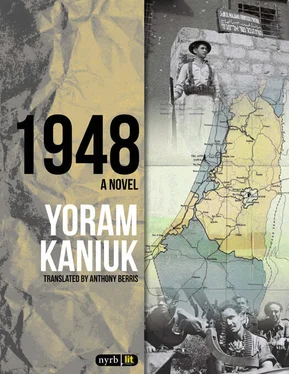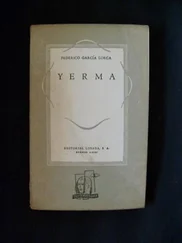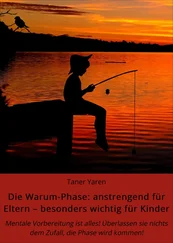We’d be woken up at five in the morning by loud banging on the corrugated iron, we ran to the sea in swimming trunks, shivering with cold, and we swam. At first three kilometers and later five, and then we’d do fifteen minutes of backbreaking physical exercises, still in our wet swimming trunks, then shower in cold water, dress quickly, and run to the dining hall. We’d have a little bread, eggplant, white cheese, drink lukewarm chicory coffee, and chew a dry cookie. After that we’d rest for half an hour and smoke, and then training would begin. When a storm came up at night we’d be woken up and run down to the beach. It was cold and wet. We’d pull the boats out of the water and chant in time, Fuck you, Bevin, and not one of us had the faintest idea why. The illegal immigrants who’d come on the ships didn’t manage to reach the shore, and no Palyam boat was waiting for them. The Palyam guys worked on the ships as escorts not deckhands, and many of them didn’t even know how to swim. Back then the immigrants were brought to the foreign ports through the mountains and the snow, and most of the time the sea was rough.
We were given lectures on navigation, sails, and sailing, and we trained by running and carrying stick rifles with improvised bayonets. And Chana — who could move a house without breaking a sweat, who beat all the heroes of the Palmach at arm wrestling, and who cried only once in her life when a woman from “there” told her about an aktion —shouted at us as we ran with fixed bayonets, I want to see a smile on your faces when you stick those Germans. I asked her if I’d have to smile in the war as I ran with my bayonet to kill the enemy, and she asked the commanding officer to give me a pep talk.
The commanding officer had very few words in his repertoire but he was known as a man who almost got killed bringing immigrants ashore and he really knew how to shout. In his hoarse voice he tried to explain to me about the struggle and the need to vanquish the enemy, and I said that I accept all that but why have we got to smile when running with our bayonets. He didn’t reply, and Chana, who’d forgotten she was mad at me, took us out to the sand dunes. An officer I didn’t know brought a pistol and fifty rounds, and each of us fired his first and last shot on the course with live ammunition, before the battles that lay ahead. When I fired my hand was shaking, my arm hurt, and Chana gave me a red pill and said that it looked like I had a stomachache. I explained that I didn’t, and she said it was already too late and in any case she didn’t have any other pills and if you do get a stomachache, she said, the pill will help anyway, and if not, it won’t do any harm.
In the ideological talks on cold and rainy winter evenings, as we sat in the boathouse that was built of tin that amplified the sound of the raindrops, we were taught what life was like in the Jewish army, and we said that we’d volunteered for the Palmach, partisans and not an army, and we were told that it’s just like an army and orders must be obeyed because the Jewish Yishuv* expected us to be prepared for any mission.
One day we were taken deep into the dunes. It was already dusk. We had a parade. It wasn’t raining. The wind sighed. We practiced concealment. Chana bellowed at every one of us to try and crawl but we had no idea about how to get deeper into the sand. On the way back I got a thorn in my foot. I sat alone facing the sea and smoked. I recalled one of father’s stories: A man held a bar mitzvah celebration for his son and invited guests, and they came to celebrate and drink and he asked his son to climb up into the loft and bring down a cask of wine, and the boy climbed up, was bitten by a snake, and didn’t return. The man climbed up to see what had happened and saw his son lying dead, and he climbed down and ate and drank with his guests and they praised the boy and in the end asked, When is the celebration? You came to celebrate, he said, and now you are mourners. My father liked that story and the pain in my foot was appropriate to the memory. I missed the smoke from my father’s pipe. I missed the sea from our balcony. There was only the sea at Caesarea.
On the course — half of whose participants would later be killed, and they wouldn’t be killed in boats but on the way to Jerusalem, at Saris, the Castel, and Nabi Samwil — was a small, painfully thin young woman, who looked like a leaf on the wind and was foreign to us, as if she’d come from nowhere. It was said she’d been a member of Lehi, that she’d killed a British sergeant, and it was also said she’d had a fling with him beforehand or maybe later, and then killed him. They said it was nothing, but for me it was the first time I’d thought about the splendor of betrayal. I thought that perhaps there was no true love unless it was for someone who’d died.
When I was a kid I was madly in love with a mysterious friend of my father’s, someone from Berlin, whom I’d seen in the only remaining photo of her that was taken ten years before I was born. She was sitting in a boat on a river in Germany and was wearing a white dress, and my father was standing beside her in a white suit and it looked as if he’d been poling while standing, and his face seemed so soft looking at her.
The girl from Lehi lived in her own tent but rowed with us. She was locked in an aura of mystery. When she said something to somebody it seemed like she was talking to herself. She looked like someone who’d escaped from a remote and beautiful castle or someone who’d come up out of a drain and prettied herself up.
Lunch was a thin vegetable soup, a little fish, lettuce, potatoes, compote, and hard black bread. I gave my compote to anybody prepared to give up his soup, and they stood in line. Ari-nom-de-plume — who in contrast with the rest of us said that the war was the most wonderful thing that had happened to him in his life, and who would die an idiotic death at Saint Simeon’s Monastery when the last round fired in the battle would hit him, and he would fall dead on his face, charred by the flames — organized the compote line and got one for free, and he managed my trading as if it were his own. I’d loved him right from the start. He had a white face. Reddish-brown hair. He had the charm of a film pirate. The Robin Hood of our sad sand dunes. The Palyam’s own Gary Cooper. He was a clever devil. He knew everything. He came from great poverty, his father died lugging a refrigerator up to the fourth floor, and it fell on him and killed him. He didn’t have any family because his mother died of grief and his brother either committed suicide or went to America. He was a loyal friend.
We trained in boats for something of which there was no need, certainly not for repelling the enemy on the road to Jerusalem. We practiced knots and fucking seamanship, and one night the senior intake had enough of me talking their ears off about the need to fight instead of this crappy training, and all kinds of what’s right and what’s not, and that the enemy isn’t only an enemy, and they got ratty, one of them broke off a shower fitting and hit someone on the head with it, and he took off yelling and there was a huge hullabaloo, and then they came over and hit me. It was raining and there were lots of them and I was beaten quite easily. The commanding officer turned up and I saw he was smiling, he didn’t like me very much, what with the Shlonsky poems I was always quoting, “With a hint of thunder-flashes the tempest cautions them, with a fiery acrostic — Omens, omens, omens!” He said that this happens on the courses because youngsters whose heads are filled with stupid poems have to vent their anger, and also because they give us sodium bicarbonate against the sex drive, and until we finish establishing a state we had to hit out now and again. He said I shouldn’t take it personally and I should take my knocks gracefully.
Читать дальше












